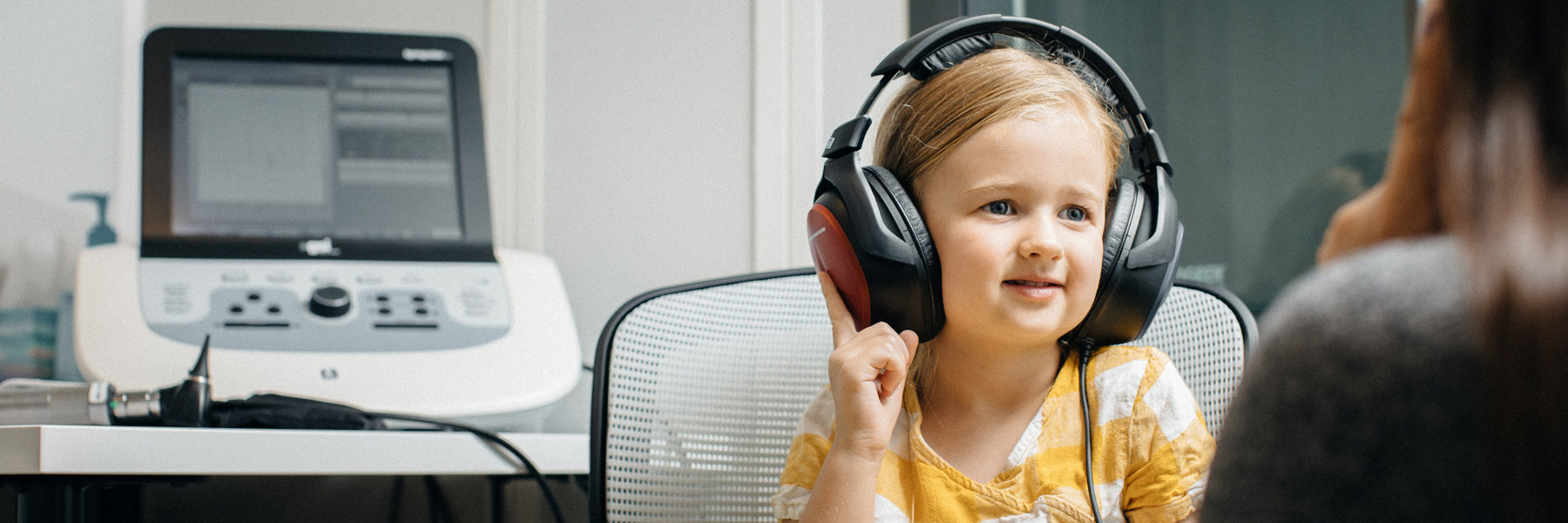About the Degree
Utah State University’s Doctor of Audiology (AuD) program is a four-year, 90 semester credit hour post-baccalaureate degree, and is part of the Western Regional Graduate Exchange program (WRGP). The AuD has a required preliminary exam, comprehensive exam, and clinical research project.
Students pursuing a doctoral degree in audiology can have a wide variety of backgrounds including but not limited to bachelor’s degrees in
- Communicative Disorders
- Psychology
- Biology
- Neuroscience
- Allied Health
- Business
Students have varied clinical practicum experiences, beginning the first semester, including:
- diagnostic assessment
- hearing aids
- assistive listening devices
- cochlear implants
- balance
- tinnitus
- auditory processing disorders
- newborn hearing screening
- educational audiology
- Interdisciplinary pediatric services
The department audiology services (Hearing and Balance, Pediatric Audiology, Cochlear Implants) are part of the Sorenson Legacy Foundation Center for Clinical Excellence, a state of the art interprofessional center providing comprehensive clinical services across the lifespan.
Contact the Graduate Program Coordinator
Roadmap for AuD Program
Year One
(fall - spring)
- Register for and complete your required classroom courses, including a year of COMD 7000: Implementation Science Seminar.
- Register for and complete COMD 7200: Introduction to Clinical Practice (i.e. your hands-on clinical learning experience).
- You will be assigned a Clinical Research Project (CRP) faculty mentor. You will then write your CRP proposal document and hold a proposal meeting with your CRP committee.
- You will begin executing your CRP during the spring semester.
Year Two
(summer - spring)
- Register for and complete your required classroom courses, including COMD 7000 in the fall and spring.
- Register for and complete COMD 7300: Intermediate Clinical Practicum (i.e. your hands-on, supervised, clinical learning experience).
- Register for, complete, and pass your AuD preliminary exam (COMD 7920) during the spring semester.
- Complete your CRP data collection, write your final document, and defend your CRP; you will also register for COMD 7870 in the spring.
- Present the findings from your CRP at a research conference.
Year Three
(summer - spring)
- Register for and complete your required classroom courses, including COMD 7000 in the fall and spring.
- Register for and complete COMD 7400: Advanced Clinical Practicum (i.e. your hands-on, supervised, clinical learning experience). Beginning in fall of Year Three, your supervised clinical learning will take place in off-campus audiology clinics across northern Utah.
- Register for and complete your approved, graduate elective course.
- Complete and pass your AuD comprehensive exam (COMD 7930).
- Register for, complete, and earn a score of 162 or higher on the Praxis Audiology (5345) exam. Submit you results directly to ASHA from ETS and report them to the COMDDE Graduate Program Coordinator.
Year Four: Externship
(summer - spring)
- Register for and complete COMD 7800 in all 3 semesters.
- Complete your 9-month, full-time supervised clinical practicum under an ASHA-certified audiologist (or its part-time equivalent).
- Submit your Graduate Application.
- Apply and interview for jobs in hearing and/or balance healthcare. Begin to investigate requirements for your targeted job’s state licensure.
- Graduate!
- If you’re interested, apply for your CCC-A through ASHA.

The doctoral (AuD) education program in audiology {residential} at Utah State University is accredited by the Council on Academic Accreditation in Audiology and Speech-Language Pathology of the American Speech-Language-Hearing Association, 2200 Research Boulevard, #310, Rockville, MD 20850, 800-498-2071 or 301-296-5700.
Students who have a complaint about compliance with accreditation standards may contact the Council on Academic Accreditation at https://caa.asha.org/, 1-800-498-2071, 1-301-296-5700, or caareports@asha.org.



